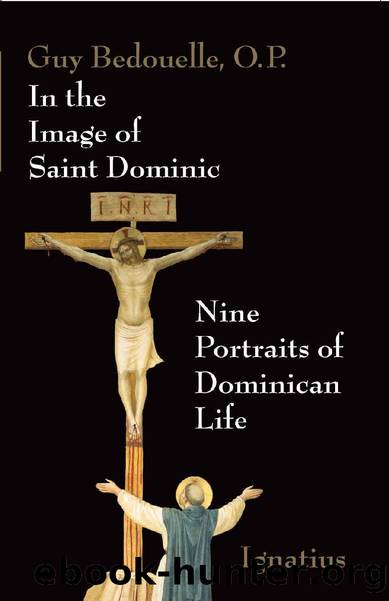In the Image of Saint Dominic by Fr. Guy Bedouelle

Author:Fr. Guy Bedouelle [Bedouelle, Fr. Guy]
Language: eng
Format: epub
Tags: Spiritual & Religion
ISBN: 9781681492605
Publisher: Ignatius Press
Published: 2016-05-11T05:00:00+00:00
6
LAS CASAS AND
THE STRUGGLE FOR JUSTICE
Father Bartolome, thank you for this support
In the dark hours of the night. . .
At the highest pitch of agony
You give hope.
ACROSS THE CENTURIES, transcending beliefs, the Chilean poet Pablo Neruda, so deeply involved in politics himself, has rendered this homage to the impassioned Dominican whose voice was raised in the sixteenth century against the decimation of South American Indians, against the pillage of the first colonization.
A Progressive Conversion
Nothing in the first part of the life of Bartolome de Las Casas could have hinted at a vocation to fight for justice or could have aroused in him that virtue of zeal that he placed in the service of peace. Born in 1484, he came from a family with a taste for adventure, which was fully satisfied, for his father and uncles sailed with Christopher Columbus on his second trip, resulting in the definitive colonization of Hispaniola, that island now divided between Haiti and Santo Domingo. Las Casas himself attempted the long voyage, and if he was in 1512 the first priest to be ordained in the New World, he remained no less blind than others to the desolation that colonization brings in its train when unhampered by scruples.
If we can believe itâit has been strongly contestedâthe figures furnished by the âVery Brief Account of the Destruction of the Indiesâ drawn up by Las Casas in 1552 reveal a horrendous decimation of populations. About the islands of San Juan and Jamaica he wrote, âThere were more than six hundred thousand people on the two islands, perhaps more than a million. Today there are only two hundred left on each island. All these Indians perished without religion, deprived of the sacraments.â
With a few exceptions, there were no massacres. But the colonists demanded labor far beyond the strength of an extremely undernourished population. Mining decimated the natives, mistakenly called Indians (because Columbus thought he had reached the Indies), for they were employed in mining the gold and silver for which the Spaniards were so avid.
In Cuba, where he was established after Hispaniola, Las Casas was no worse an encomendero than the others, even though he passed for a priest who was attached to the goods of this world and firmly determined to retain them. He did not question the legitimacy of the system, the injustice, the misconstruction of Queen Isabella of Castileâs intentions as we can see them in her last Testament of 1504, and of the declarations of the Popes, who wished to promote the evangelization of the New World.
One Sunday toward the end of 1511, however, a voice cried out âin the desertâ, that of a Dominican, Antonio of Montesinos, who did not mince words, as Las Casas reports them: âYou are in a state of mortal sin, and you will die in it, because of your cruelty to an innocent race.â1 The charge was electric. All the colonists, who believed themselves good Christians, saw themselves excluded from the sacrament of penanceâso crucial at a time when their lives were in constant dangerâfor refusing to free their slaves.
Download
This site does not store any files on its server. We only index and link to content provided by other sites. Please contact the content providers to delete copyright contents if any and email us, we'll remove relevant links or contents immediately.
Machine Learning at Scale with H2O by Gregory Keys | David Whiting(4293)
Never by Ken Follett(3937)
Harry Potter and the Goblet Of Fire by J.K. Rowling(3848)
Unfinished: A Memoir by Priyanka Chopra Jonas(3381)
Fairy Tale by Stephen King(3370)
The Man Who Died Twice by Richard Osman(3072)
Will by Will Smith(2910)
Rationality by Steven Pinker(2352)
It Starts With Us (It Ends with Us #2) by Colleen Hoover(2343)
Can't Hurt Me: Master Your Mind and Defy the Odds - Clean Edition by David Goggins(2323)
The Dark Hours by Michael Connelly(2300)
The Storyteller by Dave Grohl(2228)
Friends, Lovers, and the Big Terrible Thing by Matthew Perry(2219)
The Dawn of Everything: A New History of Humanity by David Graeber & David Wengrow(2197)
The Becoming by Nora Roberts(2188)
The Stranger in the Lifeboat by Mitch Albom(2113)
Cloud Cuckoo Land by Anthony Doerr(2098)
Love on the Brain by Ali Hazelwood(2061)
Einstein: His Life and Universe by Walter Isaacson(2010)
